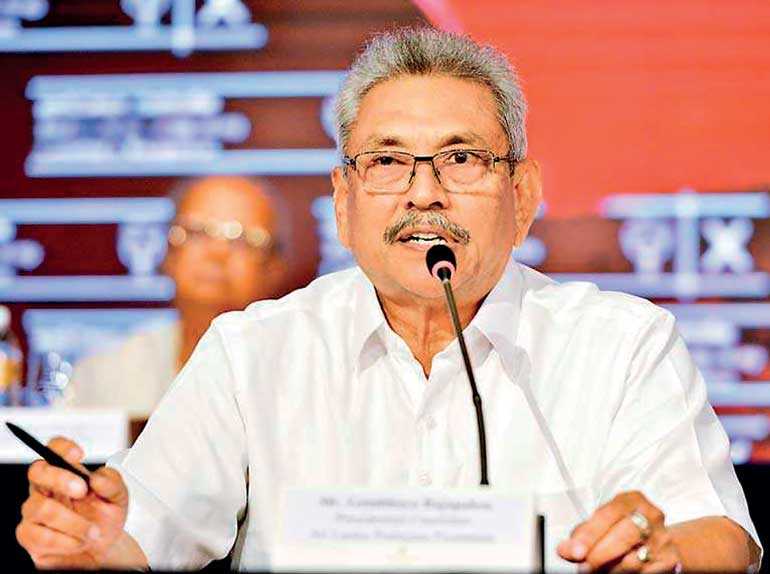Tuesday Feb 17, 2026
Tuesday Feb 17, 2026
Tuesday, 24 December 2019 00:00 - - {{hitsCtrl.values.hits}}

The move came at a time when the positive sentiment from President Rajapaksa’s election is gradually eroding with the markets and investors are waiting for his new Government’s execution of pledges for a stable economy and nation
The new Government is reminded the reality of the country’s economic health last week. The Fitch Ratings, one of the three rating agencies which assess the country’s sovereign rating, revised down the country’s rating outlook to negative.
The move could raise future foreign borrowing costs given it will increase risk premium. It comes just after 32 days since President Gotabaya Rajapaksa was elected with hopes for a politically and economically stable country.
After the rating agency’s decision, yields in Sri Lanka’s benchmark short term bonds rose 6-32 basis points in the weekly auction held on the same day Fitch revised down Sri Lanka’s outlook.
The move came at a time when the positive sentiment from President Rajapaksa’s election is gradually eroding with the markets and investors are waiting for his new Government’s execution of pledges for a stable economy and nation. 
Post-election stock and bond market have seen foreign outflows, a move that could put depreciation pressure on the rupee. The Government had hardly any time to think some alternative measures to manage its high debt repayments in a sustainable manner.
Fitch in its statement, as the reason for the downward revision, has clearly mentioned that Sri Lanka’s debt sustainability was at a risk especially after the new Government cut the taxes. According to Fitch’s statement, a very high public debt to revenue ratio of 643% continues to highlight the weak structure of Sri Lanka’s public finances. This means, every rupee the Government earns as revenue, it borrows Rs. 6.43 via public debt.
Heavy debt to GDP ratio has been continuing since early 2000 and the efforts to reduce it has not yielded desirable results. Government authorities sometimes had been even asked to manipulate numbers to understate debt and fiscal deficit figures, top Finance Ministry officials say.
Fitch’s negative statement and action also come at a time when Sri Lanka badly needs global investor confidence to build up the island nation’s economy. Weaker economy is danger to the country as it might give opportunities for some international powers to exploit Sri Lanka’s weak situation.
Financial assistance from foreign countries for a weaker economy will never come without strings or conditions. This country has seen some evidence before 2015 regime change with the country having to depend on China heavily for most of its infrastructure loans and some of those massive infrastructures are yet to give any return on investment.
Fitch also warned for a rating downgrade in the event of a failure to reduce debt/GDP ratio, an increase in external sovereign funding stresses that threaten the Government’s ability to meet upcoming debt maturities, particularly in the event of a loss of confidence by international investors, and a further deterioration in policy coherence and credibility, leading to lower GDP growth and/or macroeconomic instability. All in all, the message was very clear.
It was immediately not clear if other rating agencies Standards and Poor’s (S&P) and Moody’s would follow Fitch, but such moves will push Sri Lanka to the wall and force to borrow at expensive rate from anybody in the future, eroding the investor confidence.
Last week, I wrote on the difficulties the new Government was facing in renegotiating with the IMF to continue the current $ 1.5 billion loan. With the Fitch’s move, it has become even more difficult to start the renegotiation especially after its reverse gear on the fiscal consolidation path.
The island nation’s debt situation is reaching fresh worst situation with the time. It is under heavy strain. The foreign debt repayment for next 12 months is nearly $ 6.1 billion including $ 1.7 billion of interest payment, the latest Central Bank data showed. The Sri Lankan economy is settling in for a gradually increasing debt repayment cycle compared to what we have seen in the past.
The last Government also had to do some correction in terms of debt reporting as some of the Government loans in the previous regime had been in some other books with an aim to under report the real debt figures. If the current Government resort to similar kind of strategies, it will be only postponing the debt crisis without addressing it
The last Government under former leaders Maithripala Sirisena and Ranil Wickremesinghe were unable to reduce the debts given high external loans borrowed before their election and lack of Government revenue to buy dollars and repay such loans. So, it enacted the Active Liability Management Act to borrow money in advance when the borrowing cost is low.
The last Government also had to do some correction in terms of debt reporting as some of the Government loans in the previous regime had been in some other books with an aim to under report the real debt figures. If the current Government resort to similar kind of strategies, it will be only postponing the debt crisis without addressing it.
The new Government is focused on reviving the economy by just giving a positive shock with tax cuts, boost private sector credit growth, and create a positive sentiment in the economy. The timing of these measures also coincides with the upcoming Parliamentary Poll where Prime Minister Mahinda Rajapaksa-led Sri Lanka Podujana Peramuna (SLPP) is trying to get more than two-third majority to reverse some clauses of 19th Amendment with an aim to have clear power separation between President and Prime Minister, SLPP sources say.
The policy shift in fiscal policy and the potential for roll-back of fiscal and economic reforms in the aftermath of the last month Presidential Elections has been the main reasons for the Fitch’s decision. The rating agency believes the departure from the previous revenue-based fiscal consolidation path has created “policy uncertainty and increased external financing risk for the sovereign”, particularly given the large external debt repayments due in 2020 and beyond.
 |
| Prime Minister Mahinda Rajapaksa |
Fitch does not agree with the Government’s calculation of off-setting measures, such as adjustments to excise taxes and spending cuts on non-priority public investment and recurrent expenditure, could mitigate part of the revenue loss from the tax announcement. It also has warned the current debt to GDP ratio of 85% will be on an upward trajectory over the medium-term in the absence of off-setting measures.
The Fitch also said the outlook for the completion of the seventh and final review under the $ 1.5 billion International Monetary Fund (IMF) loan now seems uncertain and discussions of a new programme after the Parliamentary Elections expected in April 2020 could be complicated by the tax cuts.
The new Government also hit back at Fitch’s downgrade decision in a strong manner. The Finance Ministry in a statement said the rating agency’s decision “has been hastily done without considering facts on the ground”. It also said the action was “untimely” and constituted “a rush to judgement”.
The Finance Ministry also said the new Government will continue its engagement with multilateral lending agencies and the current IMF programme will have its final review by February 2020 and the authorities are certain that the performance targets for 2019 will be duly met.
“In these circumstances, we strongly believe that it is highly untimely for rating agencies to speculate negatively over the performance of the Sri Lankan economy and its outlook without appropriately analysing the effects of all the policy measures introduced by the newly formed Government which has been in office merely for one month,” it said.
Both President and Prime Minister Rajapaksa directed heads of local banks to suspend recovery of small and medium sector loans obtained up to Rs. 300 million. This could help those small-time enterprises who are struggling due to lack of confidence aftermath of a political crisis last year and then following the Easter Sunday suicide bombings.
However, the main question is who is going to bear these already given loans? Ultimately it is going to be the poor tax payers and not the Government in power.
If foreign investors were satisfied with the macroeconomic fundamentals under the previous Government and were waiting for political stability, then they will from now onwards will wait for macroeconomic fundamentals and for some positive news from international rating agencies and IMF amid satisfied political stability.
The immediate concern for the new Government after the Fitch’s decision if there could be fresh outflows from stock and bond markets and if there could be a strong depreciation pressure on the rupee. So far, the Central Bank has managed the pressure well. With the monetary policy review announcement is scheduled for this Friday, it will be interesting if the Central Bank would reduce the key policy rates to further boost the credit growth and the economy.
In the medium term, the new Government will have to manage its borrowing cost from the fresh international sovereign bonds (ISBs). The cost is likely to be expensive for Sri Lanka compared to its peers given the current situation. A better outcome from the IMF renegotiation in February next year could help the country to mitigate such expensive borrowing risks.
(The writer is former Reuters Economic Reporter for Sri Lanka. He could be reached at [email protected].)